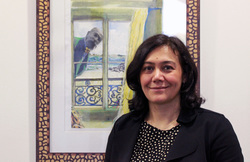Shirin Naef (Zurich/Bonn): Bioethics and religious law. The principle of doing good deed and its applications in contemporary reproductive practices
Abstract
In her lecture, Shirin Naef will explore the merit of a “good deed” in the contexts of modern genetic and reproductive technologies from the perspective of Shia Islamic jurisprudence (fiqh) and ethics. She will likewise reiterate its importance in the field of bioethical issues and practice, particularly with regard to the use of human bodily and genetic materials, and the impact such new technical variables have on our contemporary understanding of family structures and practices. The rapid developments that have occurred in the medical and biotechnology fields have not only faciliateded great accomplishments in healthcare and treatment, but also brought forth challenges and different moral contradictions that have stirred controversies in bioethics. One of the main ethical challenges focuses on the commodification of body parts and persons.
Based on these findings, Shirin Naef will present a Shia Islamic perspective to try to tackle these ethical challenges by drawing on concepts such as “remuneration” and “reward”, and emphasizing the importance of the act of charitable giving itself. From a theoretical point of view, she will aim to contribute to the global bioethical discourse by providing some legal and moral principles and ideas in the tradition of Islamic jurisprudence and ethics and their contemporary reception. The lecture will draw on extensive ethnographic research on the regulation and implementation of reproductive technologies in Iran, combined with ongoing textual analysis and mapping of legal and theological debates and positions taken by religious authorities and legal experts.
Dr. Shirin Naef
Curriculum Vitae
Dr. Shirin Naef is an anthropologist and primarily works in an interdisciplinary field between law, religion, and ethics, focusing specifically on the Persian-speaking cultural area. She was a student of Theater and English in Teheran before studying Anthropology, Islam Studies, and Linguistics at the University of Bern (Switzerland) from 2002 to 2008. From 2009 to 2012, she was a recipient of a DFG stipend and a member of the graduate research center for bioethics at the International Center for Ethics in the Sciences (Internationales Zentrum für Ethik in den Wissenschaften, IZEW) at the University of Tübingen. In 2011, she additionally completed a fellowship at the School of Social Anthropology at the University of Manchester. In 2015, she was also a visiting researcher at the Brocher Foundation in Geneva. Most recently, Shirin Naef earned her doctoral degree from the University of Zurich’s Faculty of Philosophy in 2017 with a dissertation on “Kinship, Law and Religion: An Anthropological Study of Assisted Reproductive Technologies in Iran”. She is currently an associate researcher at the University of Zurich’s Institute for Social Anthropology and Empirical Cultural Science (Institut für Sozialanthropologie und Empirische Kulturwissenschaft, ISEK).
Dr. Naef’s main research interests include Shia Islam and jurisprudence (fiqh), bioethics, theology from a comparative perspective, material culture, and the history of science. Furthermore, Dr. Naef focuses on reproductive medicine, kinship, and sexuality and has been researching topics including philanthropy, the common good, morality, and economy since 2017.
Since October 2018 Dr. Shirin Naef is Fellow at the Käte Hamburger Center for Advanced Study in the Humanities “Law as Culture”.





